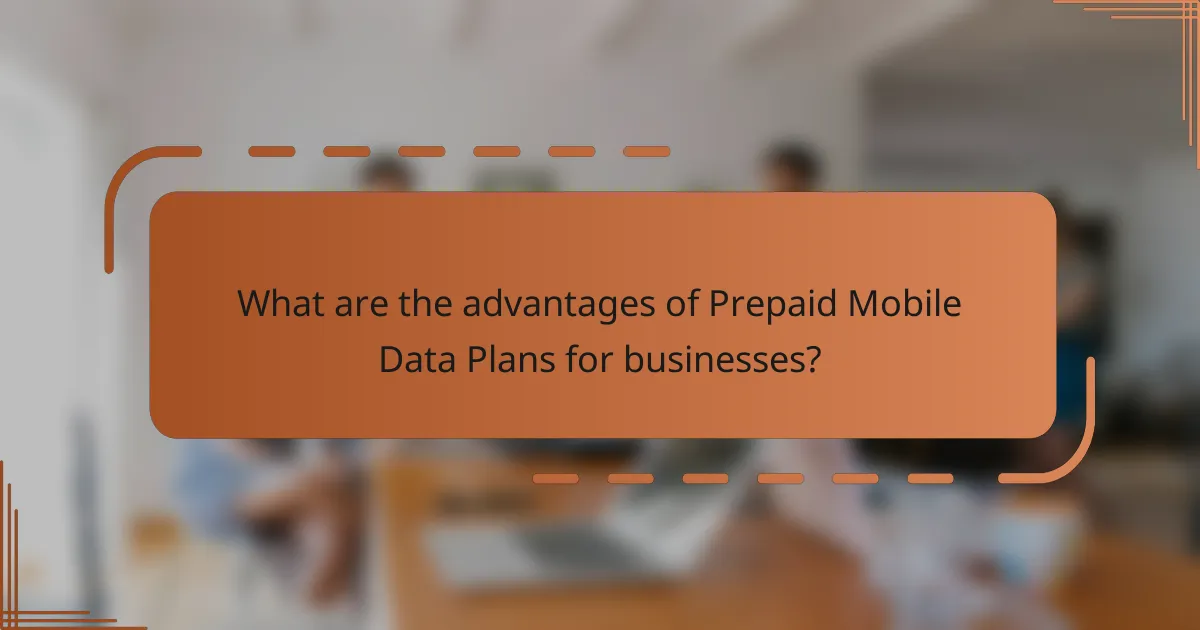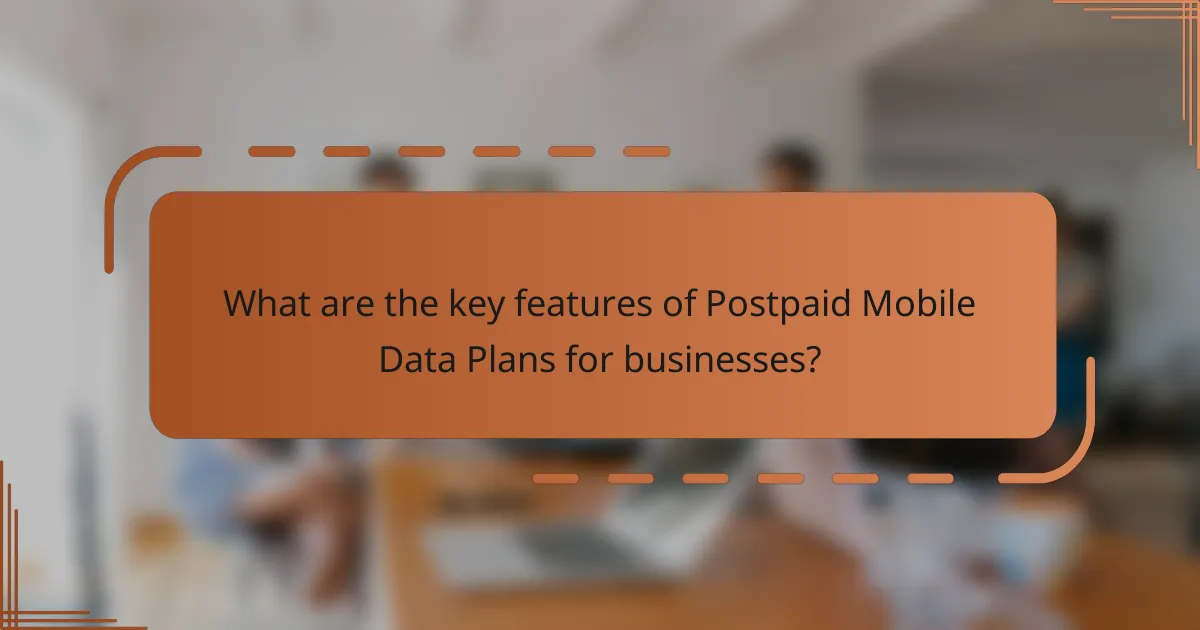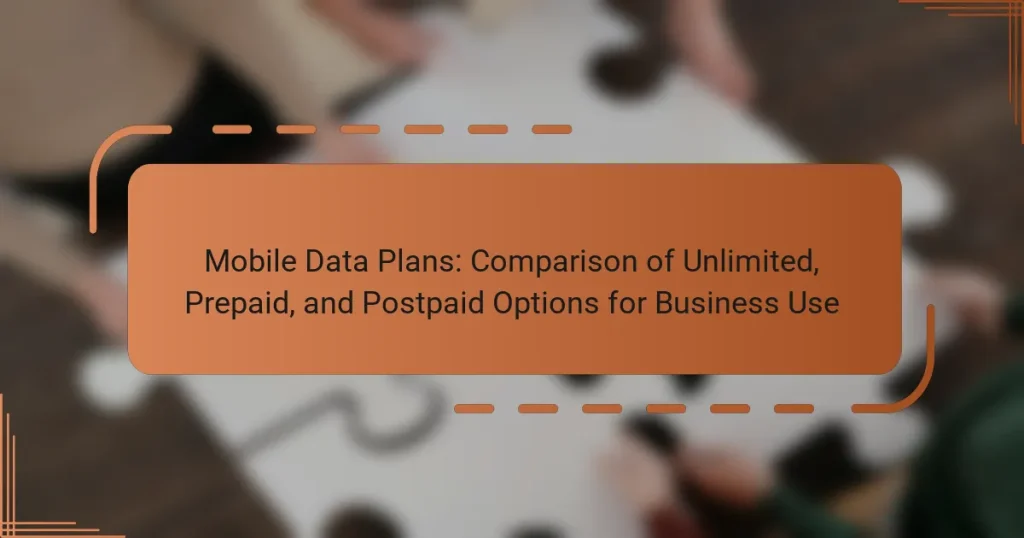Mobile data plans are subscription services that enable internet access through cellular networks, crucial for both individuals and businesses. This article compares three primary types of mobile data plans: unlimited, prepaid, and postpaid. Unlimited plans offer unrestricted data usage, while prepaid plans provide cost control without long-term commitments. Postpaid plans typically feature shared data allowances and additional benefits like international roaming. The article highlights the advantages of each plan type, including operational efficiency, budgeting predictability, and enhanced connectivity for businesses.

What are Mobile Data Plans?
Mobile data plans are subscription services that provide users with access to the internet via cellular networks. These plans allow individuals and businesses to connect their devices to the internet without relying on Wi-Fi. Mobile data plans typically come in various formats, including unlimited, prepaid, and postpaid options.
Unlimited plans offer unrestricted data usage for a monthly fee. Prepaid plans require users to pay for data upfront, with no long-term commitment. Postpaid plans bill users at the end of the month based on their data consumption.
According to the Federal Communications Commission, mobile data usage in the U.S. reached over 40 exabytes in 2020, highlighting the importance of these plans for connectivity.
How do Mobile Data Plans function for businesses?
Mobile data plans function for businesses by providing internet connectivity through cellular networks. These plans allow employees to access data for work-related tasks on mobile devices. Businesses can choose from various options, including unlimited, prepaid, and postpaid plans. Unlimited plans offer unrestricted data usage, which is beneficial for heavy users. Prepaid plans require payment upfront and can help manage budgets effectively. Postpaid plans are billed monthly and often include additional features like family sharing and device financing. Businesses benefit from mobile data plans by enhancing productivity and communication. According to a report by the Pew Research Center, 85% of adults use smartphones, highlighting the importance of mobile connectivity for business operations.
What are the key components of Mobile Data Plans?
Key components of mobile data plans include data allowance, speed, cost, and contract terms. Data allowance refers to the amount of data a user can consume within a billing cycle. Typical data allowances range from a few gigabytes to unlimited options. Speed indicates how fast data can be downloaded or uploaded, often measured in Mbps. Cost is the monthly fee associated with the plan, which varies based on data allowance and speed. Contract terms outline the duration of the agreement, including early termination fees. Additional features may include rollover data, international roaming, and hotspot capabilities. These components help users select a plan that fits their needs.
How do different components impact business operations?
Different components impact business operations by influencing efficiency, cost management, and decision-making. For instance, mobile data plans affect communication capabilities. Unlimited plans offer consistent connectivity, enhancing collaboration. Prepaid options allow businesses to control spending effectively. Postpaid plans often provide additional features, such as higher data limits. Each plan type can directly affect operational agility. Research shows that businesses with reliable mobile solutions report 20% higher productivity. Thus, the choice of mobile data plan components is crucial for optimizing business performance.
What types of Mobile Data Plans are available?
The types of mobile data plans available include unlimited, prepaid, and postpaid options. Unlimited plans offer unrestricted data usage for a fixed monthly fee. Prepaid plans require users to pay upfront for a specific data amount, which can be used until exhausted. Postpaid plans involve a monthly billing cycle, where users pay for the data used after the fact. Each plan type caters to different user needs and preferences. For instance, unlimited plans are ideal for heavy data users, while prepaid plans offer flexibility without long-term commitments. Postpaid plans often come with additional features like family sharing and device financing options.
What distinguishes Unlimited, Prepaid, and Postpaid plans?
Unlimited plans offer unrestricted data usage without overage fees. They provide continuous access to data once a monthly fee is paid. Prepaid plans require upfront payment for a set amount of data. Users must renew their plan before it expires to maintain service. Postpaid plans bill users after data usage, typically on a monthly cycle. They often come with contracts and may include additional features like family plans. Unlimited plans generally have higher monthly costs but provide peace of mind. Prepaid and postpaid plans offer flexibility in payment options and data limits.
How can businesses choose the right type of plan?
Businesses can choose the right type of mobile data plan by assessing their specific needs. They should evaluate data usage patterns to determine the required data volume. Understanding the number of users and devices is also critical. Businesses must consider their budget constraints when selecting a plan. Comparing unlimited, prepaid, and postpaid options helps identify the best fit. Unlimited plans offer flexibility for high data users. Prepaid plans provide cost control and no long-term commitment. Postpaid plans often include additional features but may have higher costs. Analyzing these factors ensures the chosen plan aligns with business goals and operational requirements.

What are the benefits of Unlimited Mobile Data Plans for businesses?
Unlimited mobile data plans provide businesses with consistent and uninterrupted internet access. This ensures that employees can stay connected at all times. Reliable connectivity supports seamless communication and collaboration among team members. Additionally, businesses can avoid overage charges associated with limited data plans. This predictability in budgeting helps in financial planning. Unlimited plans also facilitate the use of cloud-based applications without concern for data limits. Enhanced productivity is a direct benefit, as employees can access necessary resources without restrictions. According to a study by Deloitte, businesses utilizing unlimited data plans report a 20% increase in operational efficiency.
How do Unlimited plans enhance business productivity?
Unlimited plans enhance business productivity by providing unrestricted access to mobile data. This allows employees to communicate and collaborate without interruptions. With unlimited data, businesses can utilize cloud applications seamlessly. Employees can access real-time information and updates from anywhere. This flexibility increases responsiveness to customer needs. Additionally, unlimited plans reduce the stress of overage charges. Businesses can focus on operations rather than data limits. According to a study by Deloitte, companies using mobile data effectively see a 20% increase in productivity.
What specific features make Unlimited plans advantageous?
Unlimited plans offer several advantageous features. They provide unrestricted data usage without overage charges. This allows users to stream, browse, and download without worrying about hitting a data cap. Many unlimited plans also include additional perks such as mobile hotspot capabilities. This enables users to share their data connection with other devices. Furthermore, some plans offer priority data, ensuring better speeds during peak usage times. Unlimited plans often come with simplified billing, making budgeting easier for businesses. According to a report by the Federal Communications Commission, unlimited plans can save users money compared to pay-per-use plans when high data usage is consistent.
How do Unlimited plans compare in cost-effectiveness?
Unlimited plans are often considered cost-effective for heavy data users. They provide a fixed monthly cost regardless of data consumption. This structure can lead to savings for businesses that require constant connectivity. According to a study by the Federal Communications Commission, unlimited plans can save users up to $300 annually compared to limited data plans. Additionally, businesses with multiple lines may benefit from family or group discounts, further enhancing cost-effectiveness. Overall, unlimited plans can be financially advantageous for users with high data needs.
What limitations might businesses face with Unlimited plans?
Businesses may face several limitations with Unlimited plans. These plans often come with data deprioritization during peak usage times. This means that after a certain data threshold, speeds may slow down significantly. Additionally, Unlimited plans may have fair usage policies that can restrict data speeds or access. Some providers may impose additional fees for exceeding certain data limits. Furthermore, businesses might encounter limited customer service options with these plans. Contractual obligations can also restrict flexibility in switching plans or providers. Lastly, businesses may not have access to the same level of network priority as higher-tier plans.
Are there any data throttling policies to consider?
Yes, data throttling policies are important to consider when evaluating mobile data plans. Data throttling refers to the intentional slowing down of internet speed by a service provider after a user exceeds a certain data limit. Many unlimited plans, for instance, may still impose throttling once users reach a specified threshold, such as 22 GB in a billing cycle. This practice is common among major carriers to manage network congestion. It is essential to review the terms of service for specific data limits and throttling conditions associated with each plan. Understanding these policies helps businesses select the most suitable mobile data option for their needs.
How do network congestion issues affect Unlimited plans?
Network congestion issues can significantly impact Unlimited plans. During peak usage times, users may experience slower data speeds. This is due to the network being overloaded with high traffic. Many providers implement deprioritization policies for Unlimited plans. When congestion occurs, these plans may throttle speeds after a certain data threshold is reached. For example, a user may have unlimited data but face reduced speeds after using 22 GB in a billing cycle. This practice is common among major carriers to manage network resources effectively. Thus, network congestion can lead to decreased performance for users on Unlimited plans during busy periods.

What are the advantages of Prepaid Mobile Data Plans for businesses?
Prepaid mobile data plans offer several advantages for businesses. They provide cost control by allowing businesses to pay only for the data they need. This prevents unexpected charges and helps in budgeting. Prepaid plans often come without long-term contracts, offering flexibility. Businesses can adjust their plans based on changing needs. Additionally, prepaid plans typically have no credit checks, making them accessible for all companies. They also enable easy management of employee data usage. According to a report by the Federal Communications Commission (FCC), businesses using prepaid plans can save up to 30% on mobile expenses compared to traditional postpaid plans.
How do Prepaid plans provide flexibility for businesses?
Prepaid plans provide flexibility for businesses by allowing them to manage costs effectively. Businesses can adjust their spending based on current needs without long-term commitments. These plans typically require no contracts, enabling easy cancellation or changes. Companies can scale data usage up or down as needed. This adaptability is crucial for businesses with fluctuating data demands. Additionally, prepaid plans often include a range of data options, allowing businesses to select what suits them best. This flexibility can lead to better budget management and operational efficiency.
What are the cost implications of Prepaid plans?
Prepaid plans typically require an upfront payment for a set amount of data or services. This model can lead to predictable monthly costs, as users pay in advance. It eliminates the risk of overage charges, which can occur with postpaid plans. Prepaid plans often come with lower overall costs compared to postpaid options. According to a study by the Federal Communications Commission, prepaid users often save 20-30% on average compared to postpaid users. Additionally, prepaid plans can provide flexibility, allowing users to switch plans or providers without long-term commitments.
How can businesses manage their data usage with Prepaid plans?
Businesses can manage their data usage with prepaid plans by monitoring their consumption regularly. They should utilize mobile management applications to track data usage in real-time. Setting data limits on devices can prevent overages and unexpected charges. Businesses can also educate employees about data-efficient practices. This includes using Wi-Fi whenever available and minimizing high-data activities like streaming. Additionally, selecting the right prepaid plan that aligns with expected usage is crucial. Prepaid plans often have data caps, so understanding these limits helps in planning effectively. According to a report from the Federal Communications Commission, businesses can save costs by optimizing data usage, which is essential for budget management.
What challenges do businesses encounter with Prepaid plans?
Businesses encounter several challenges with prepaid plans. One significant issue is the lack of flexibility. Prepaid plans often require upfront payment, limiting cash flow management. Additionally, businesses may face restrictions on data usage. Exceeding data limits can result in throttled speeds or additional charges. Another challenge is the potential for inconsistent service quality. Prepaid services may not offer the same network prioritization as postpaid plans. This can lead to connectivity issues during peak usage times. Furthermore, customer support for prepaid plans is often less comprehensive. Businesses may struggle to resolve issues quickly, impacting productivity. Lastly, the inability to build credit with prepaid plans can hinder future financing options. These factors contribute to the overall complexity of managing prepaid mobile data plans for businesses.
Are there limitations on data speeds or network access?
Yes, there are limitations on data speeds and network access. Mobile data plans often include throttling after reaching a specific data limit. For example, some unlimited plans may reduce speeds once a user exceeds 22 GB of data usage per month. Network access can also be restricted based on coverage areas. In rural regions, data speeds may be slower due to limited infrastructure. Additionally, certain mobile carriers may prioritize network access for specific users or business accounts during peak times. These limitations can vary significantly between prepaid and postpaid plans.
How do businesses handle unexpected data needs with Prepaid plans?
Businesses handle unexpected data needs with prepaid plans by purchasing additional data packages. These packages can be acquired quickly, allowing for immediate access to more data. Many prepaid service providers offer flexible options for adding data. Businesses typically monitor their data usage through apps or online accounts. This monitoring helps identify when additional data is necessary. Some providers allow for real-time data top-ups. This feature enables businesses to respond promptly to increased data demands. Additionally, businesses may set alerts for data thresholds to prevent overages. This proactive approach ensures uninterrupted service during critical periods.

What are the key features of Postpaid Mobile Data Plans for businesses?
Postpaid mobile data plans for businesses typically offer several key features. These plans provide unlimited data options, allowing for extensive usage without overage fees. They commonly include shared data allowances across multiple lines, which can enhance cost efficiency for businesses with several employees. Postpaid plans often come with flexible billing cycles, allowing businesses to manage cash flow effectively.
Additionally, they frequently offer international roaming options, enabling businesses to maintain connectivity while traveling. Many postpaid plans also include advanced customer support services tailored for business needs. Some plans may feature device financing options, allowing businesses to acquire new smartphones or tablets without a large upfront cost.
According to industry research, businesses that utilize postpaid plans report higher satisfaction due to the reliability and support tailored to their operational needs.
How do Postpaid plans support business growth?
Postpaid plans support business growth by offering predictable billing and flexible data options. Businesses can manage cash flow effectively since costs are known each month. These plans often provide higher data limits, enabling seamless communication and operations. Additionally, postpaid plans typically include features like international roaming and priority customer support. Such features enhance business productivity and connectivity. Research shows that companies using postpaid plans experience fewer disruptions due to data limitations. This reliability fosters better customer service and operational efficiency, crucial for growth.
What billing structures are common in Postpaid plans?
Common billing structures in postpaid plans include monthly billing, tiered pricing, and family plans. Monthly billing charges a fixed amount each month for a set amount of data and services. Tiered pricing offers different data packages at varying price points, allowing users to choose based on their needs. Family plans enable multiple lines under one account, often providing a discount for additional lines. These structures provide flexibility and predictability in mobile expenses.
How do businesses benefit from contract agreements in Postpaid plans?
Businesses benefit from contract agreements in postpaid plans through predictable budgeting and cost management. These plans typically offer fixed monthly rates, allowing businesses to forecast expenses accurately. Additionally, postpaid plans often include bulk data packages, which can lead to reduced per-unit costs. This structure can enhance cash flow management for businesses. Furthermore, contract agreements may provide access to premium services and features, such as priority customer support. Many carriers also offer device financing options within these agreements, allowing businesses to acquire necessary technology without upfront costs. This can result in improved operational efficiency. Overall, contract agreements in postpaid plans support long-term planning and resource allocation for businesses.
What potential drawbacks do businesses face with Postpaid plans?
Businesses face several potential drawbacks with postpaid plans. One major issue is the risk of unexpected charges. Usage beyond the agreed limits can lead to overage fees. Another drawback is the commitment to long-term contracts. These contracts can limit flexibility and may involve early termination fees. Additionally, postpaid plans often require a credit check. This can be a barrier for some businesses with limited credit history. Businesses may also experience higher monthly costs compared to prepaid options. This is particularly true if their data needs fluctuate. Furthermore, postpaid plans may not offer the same level of control over expenses. This can complicate budgeting and financial planning for businesses.
How do long-term contracts impact business flexibility?
Long-term contracts can significantly reduce business flexibility. These agreements often lock businesses into specific terms for extended periods. This can limit the ability to adapt to changing market conditions. Businesses may find it challenging to switch providers or adjust their plans. For example, a company may miss out on better pricing or services from competitors. Additionally, long-term contracts can hinder the ability to scale operations quickly. If a business’s data needs increase, it may face penalties for early termination. Overall, while long-term contracts can provide stability, they often come at the cost of flexibility.
What should businesses consider regarding overage charges?
Businesses should consider the cost implications of overage charges in mobile data plans. Overage charges occur when data usage exceeds the allocated limit of a plan. These charges can significantly increase monthly expenses. Businesses must evaluate the likelihood of exceeding data limits based on usage patterns. Analyzing historical data can help predict future usage. Additionally, comparing plans that offer higher data limits or unlimited options may be beneficial. Understanding the specific overage rates of different carriers is crucial. Some carriers may have steep charges, while others offer more reasonable rates. Ultimately, choosing the right plan can prevent unexpected costs.
What factors should businesses consider when comparing Mobile Data Plans?
Businesses should consider several factors when comparing mobile data plans. Key factors include data limits, coverage areas, and pricing structures. Data limits determine how much data can be used monthly. Coverage areas ensure reliable service in essential locations. Pricing structures can vary between unlimited, prepaid, and postpaid options. Businesses should also evaluate contract terms and any additional fees. Customer support availability is crucial for resolving issues quickly. Lastly, consider the flexibility to upgrade or downgrade plans as business needs change.
What tips can help businesses choose the best Mobile Data Plan for their needs?
Businesses should assess their data usage needs to choose the best mobile data plan. Understanding how much data is required for daily operations is crucial. Analyze employee usage patterns and consider peak data times. Compare different plan types: unlimited, prepaid, and postpaid. Unlimited plans offer flexibility for high usage. Prepaid plans provide cost control and no long-term commitment. Postpaid plans often include additional features and benefits. Evaluate network coverage and reliability in your area. Research customer reviews and service provider ratings. Lastly, consider any potential discounts for business accounts. These steps will help ensure that the selected mobile data plan aligns with business needs.
Mobile data plans are subscription services that enable internet access via cellular networks, essential for both individuals and businesses. This article provides a comprehensive comparison of unlimited, prepaid, and postpaid mobile data plans, detailing their key components, advantages, and potential drawbacks. It highlights how these plans can impact business operations, productivity, and cost management, while offering insights into selecting the most suitable option based on specific needs and usage patterns. Additionally, the article discusses the implications of data limits, network access, and customer support associated with each plan type.


